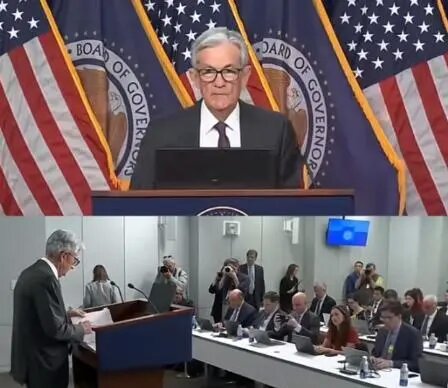
On the global economic chessboard, every move made by the Federal Reserve has a ripple effect. Recently, the inflation warning issued by the Federal Reserve is like a giant rock thrown into a calm lake, causing ripples and triggering a series of chain reactions in various fields such as financial markets, economic development, and the lives of ordinary people.
The most direct impact of the Federal Reserve's inflation warning is reflected in the financial markets. When the warning message came out, the stock market instantly plunged into turmoil. Taking technology stocks as an example, after Powell issued a strong inflation warning, all three major US stock indexes closed down, and technology stocks became the hardest hit area. Nvidia's stock price fell 6.9% on the same day, marking the largest daily decline since January, and its market value evaporated by $1881 billion overnight. The stock prices of other tech giants such as AMD, Apple, and Microsoft have also collectively fallen. Investors' concerns about rising inflation potentially leading to increased costs and declining profits for businesses have caused funds to withdraw from the stock market and shift towards safer assets.
The bond market was also not spared. The yield of 10-year US treasury bond fluctuated. With the increase of uncertainty, the price and yield of bonds changed inversely, and investors became more cautious about buying and selling bonds. The gold market is showing a complex trend due to inflation warnings. On the one hand, the rise in inflation expectations has increased the attractiveness of gold as a hedge asset; On the other hand, the possible interest rate hikes by the Federal Reserve will increase the opportunity cost of holding gold. Recently, the price of gold has approached $3350 per ounce, with the first weekly decline of over 2% this month. However, the price of gold has still risen by over a quarter this year and is still close to the historical record set in April, which was slightly above $3500 per ounce.
The Federal Reserve's inflation warning has also put its monetary policy in a dilemma. If we choose to raise interest rates to curb inflation, it may lead to further slowdown in economic growth and even trigger an economic recession. Raising interest rates will increase the financing costs of enterprises, and some high debt enterprises may face the risk of capital chain breakage, which in turn may trigger a wave of corporate bankruptcies and increase unemployment rates. Although the number of initial jobless claims in the United States decreased slightly last week, it remained stable near an eight month high, and the number of people continuously applying for unemployment benefits was also at a high level, reflecting that the labor market is gradually slowing down, and interest rate hikes may exacerbate this trend.
However, if effective measures are not taken to control inflation and prices continue to rise, it will erode people's wealth, reduce consumers' purchasing power, and trigger social instability factors. In this situation, the Federal Reserve needs to carefully find a balance between controlling inflation and maintaining economic growth, making decision-making difficult. From the current perspective, the Federal Reserve has maintained interest rates unchanged for four consecutive times, but at the same time raised inflation expectations, raising this year's inflation expectations and the median core PCE price index by 0.3 percentage points to 3.1%, lowering its expectations for US GDP growth, and lowering this year's median GDP growth expectations by 0.3 percentage points to 1.4%. This demonstrates the Federal Reserve's cautious attitude towards the current economic situation and its indecision in monetary policy decisions.
In today's globalized economy, the impact of the Federal Reserve's inflation warning is not limited to the United States, but also transmitted globally through international trade and financial markets. For other countries, the United States is an important trading partner and investment destination. The slowdown in US economic growth and rising inflation will lead to a decrease in its import demand, affecting the export trade of other countries. The economic growth of emerging market countries often relies on exports, and the decline in demand in the US market may pose challenges to their economic growth, such as reduced orders and insufficient factory operating rates for manufacturing export companies in some Southeast Asian countries.
In addition, adjustments to the Federal Reserve's monetary policy will trigger changes in global capital flows. When the expectation of interest rate hikes in the United States increases, global funds will flow to the United States, causing capital outflows from other countries' capital markets and increasing pressure for currency depreciation. The currency exchange rates of some emerging market countries fluctuated significantly, such as the Argentine peso and the Türkiye lira, which posed great challenges to their financial stability.
The Federal Reserve's inflation warning is like a storm, with profound impacts on financial markets, economic growth, monetary policy, and global economic linkage. Whether investors, businesses, or ordinary people, they all need to closely monitor the Federal Reserve's subsequent policy movements and adjust their investment, production, and consumption strategies in a timely manner to cope with possible economic changes. And the Federal Reserve also needs to make scientific and reasonable decisions in complex economic situations to maintain the stability and development of the US and even the global economy.

The South Korean political arena has once again been embroiled in a public controversy over a judicial investigation that has shaken the entire nation.
The South Korean political arena has once again been embroi…
On the morning of December 29th local time, the precious me…
According to the US media Barchart, recently, the fluctuati…
On December 29th, Mar-a-Lago in Florida, USA, witnessed a h…
SoftBank Group announced on Monday that it has agreed to ac…
Recently, the US State Department issued a visa ban, adding…